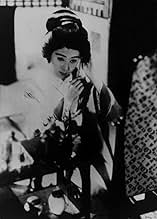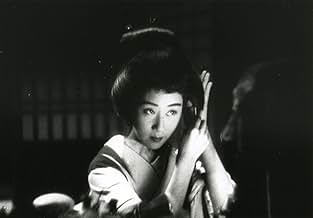VALUTAZIONE IMDb
7,4/10
3169
LA TUA VALUTAZIONE
Aggiungi una trama nella tua linguaTwo geisha sisters lead a hard life in the Gion district of Kyoto. After one of them feels obliged to support a bankrupt businessman, the other sister sets up various schemes to get rid of h... Leggi tuttoTwo geisha sisters lead a hard life in the Gion district of Kyoto. After one of them feels obliged to support a bankrupt businessman, the other sister sets up various schemes to get rid of him.Two geisha sisters lead a hard life in the Gion district of Kyoto. After one of them feels obliged to support a bankrupt businessman, the other sister sets up various schemes to get rid of him.
- Regia
- Sceneggiatura
- Star
- Premi
- 1 vittoria in totale
Namiko Kawashima
- Oemi Furusawa
- (as Kazuko Kuno)
Fumio Ôkura
- Jurakudo, the antiques dealer
- (as Fumio Okura)
Recensioni in evidenza
"Sisters of Gion" is a Japanese film directed by Kenji Mizoguchi. It apparently must be very well thought of, as it's part of a set of Mizoguchi films in a DVD set from the artsy Criterion Collection. While I could see the artistry of the cinematography, I wasn't super-impressed by the story. It left me a bit flat.
When the film begins, it looks a bit like a Yasujirô Ozu film because the camera in set at a level about that of a person sitting on the floor. And, like Ozu, the camera lens does not move back or forth.--it's a stationary box. But, unlike Ozu, while the cameraman does not move the camera, it does move on a track--making for an incredibly interesting opening shot. In fact, the film is full of interesting shots--with unusual angles, composition and depth. It's almost like the camera is a tiny one that is peeking into rooms--and it's very nice--probably the nicest looking Japanese cinematography from this era that I have seen.
Now the story of "Sisters of Gion" ("Gion No Shimai") is not particularly enjoyable--mostly because the folks in it aren't particularly likable and the story is only mildly interesting--except, perhaps, to someone wanting insight into the role of women in 1930s Japan. This aspect of the film is unusual--how one woman embraces power and her sister embraces conventionality and kindness. It's obvious the film was not meant as a feel-good film but a sad portait of the lives of women in the lower classes.
A man has just lost his business and moves in with the geisha he used to sponsor. You might have felt sorry for him, but in the process he left his family and seemed very self-involved. This geisha he goes to is a very nice and dutiful woman, as she is under no obligation to take him in but she does. However, her younger sister, also a geisha, is rather conniving and VERY practical. She will get a wealthy sponsor one way or another. This, ultimately, leads to a rather interesting relationship with Mr. Kimura--but you'll have to see that for yourself. I'd say that the acting, camera-work and direction were good. But I just didn't care a lot for the characters or their problems--though the story was darkly compelling and provocative.
When the film begins, it looks a bit like a Yasujirô Ozu film because the camera in set at a level about that of a person sitting on the floor. And, like Ozu, the camera lens does not move back or forth.--it's a stationary box. But, unlike Ozu, while the cameraman does not move the camera, it does move on a track--making for an incredibly interesting opening shot. In fact, the film is full of interesting shots--with unusual angles, composition and depth. It's almost like the camera is a tiny one that is peeking into rooms--and it's very nice--probably the nicest looking Japanese cinematography from this era that I have seen.
Now the story of "Sisters of Gion" ("Gion No Shimai") is not particularly enjoyable--mostly because the folks in it aren't particularly likable and the story is only mildly interesting--except, perhaps, to someone wanting insight into the role of women in 1930s Japan. This aspect of the film is unusual--how one woman embraces power and her sister embraces conventionality and kindness. It's obvious the film was not meant as a feel-good film but a sad portait of the lives of women in the lower classes.
A man has just lost his business and moves in with the geisha he used to sponsor. You might have felt sorry for him, but in the process he left his family and seemed very self-involved. This geisha he goes to is a very nice and dutiful woman, as she is under no obligation to take him in but she does. However, her younger sister, also a geisha, is rather conniving and VERY practical. She will get a wealthy sponsor one way or another. This, ultimately, leads to a rather interesting relationship with Mr. Kimura--but you'll have to see that for yourself. I'd say that the acting, camera-work and direction were good. But I just didn't care a lot for the characters or their problems--though the story was darkly compelling and provocative.
This movie, about two geisha sisters who lead a hard life in the Gion district of Kyoto, is a good drama movie!
I personally do not have much to say about it. The movie is not amazing or incredible for my part, but it has some funny moments where the main plot is the most compelling element. It feels slow at times, but fortunately, it is quite short to be a feature film, and it is also nicely shot and the actors do good. I am glad I took it a visit because I had a good time!
Despite not being a masterpiece, this movie is a good drama with humor and a strong plot. Solid acting and visuals make it worth a watch.
I personally do not have much to say about it. The movie is not amazing or incredible for my part, but it has some funny moments where the main plot is the most compelling element. It feels slow at times, but fortunately, it is quite short to be a feature film, and it is also nicely shot and the actors do good. I am glad I took it a visit because I had a good time!
Despite not being a masterpiece, this movie is a good drama with humor and a strong plot. Solid acting and visuals make it worth a watch.
This film is about geishas on Kyoto, Japan, in how they live and ply their trade. Since it was made by Mr. Mizoguchi, who seemed to have a fascination with prostitutes, it is right up his alley. While good, the story did not completely grab me like some of his others, especially "Street Of Shame" and "Ugetsu". The film's success is in the message it portrays as to these ladies, that they are somewhat trapped in their existence with no way out, broke and looking for a patron to take them out of that life. However, I did not find the characters to be as developed as I would have liked, so the film loses steam, even though it is a fairly short film, much less than ninety minutes. Still worth watching, it just doesn't have the depth of some of his other films.
I'm surprised by the fact that Mizoguchi was doing this kind of filmmaking and a strong criticism on geisha's lives in those years already. It must have been really innovative at the time and, for the same reason, it might probably not have been appreciated by most of the audience. I find it ironic because now it has aged considerably, that it is also hard to appreciate by today's standards. In order to fully comprehend its content, one would have to watch it with an open mind and submerge into its time. Also, the print quality might not be good, which is yet another obstacle that may keep viewers from appreciating the film as well. Fortunately, I was able to get hold of a high quality print, and it is also a great privilege to behold Mizoguchi's filmmaking techniques; I for one consider them to be of great importance in cinema history.
The story concerns two geisha sisters who live in a neighborhood known as Gion, in Kyoto. They are very different from each other; one side is influenced by a more modernized mindset, whilst the other is still rooted in traditional manners. This existing contrast will slowly unravel as the film goes on.
Technically, the film is outstanding for its time. We have that riveting tracking shot at the beginning of the film that thoroughly advances through the house of the patron of one of our two protagonists. Subsequently, you'll find yourself immersed in the many sequence shots the film is divided in.
If you're fond of Japanese cinema, you should definitely watch this forgotten gem.
My score: 8.8/10
The story concerns two geisha sisters who live in a neighborhood known as Gion, in Kyoto. They are very different from each other; one side is influenced by a more modernized mindset, whilst the other is still rooted in traditional manners. This existing contrast will slowly unravel as the film goes on.
Technically, the film is outstanding for its time. We have that riveting tracking shot at the beginning of the film that thoroughly advances through the house of the patron of one of our two protagonists. Subsequently, you'll find yourself immersed in the many sequence shots the film is divided in.
If you're fond of Japanese cinema, you should definitely watch this forgotten gem.
My score: 8.8/10
Umekichi, a geisha in the Gion district of Kyoto, feels obliged to help her lover Furusawa when he asks to stay with her after becoming bankrupt and leaving his wife. However her younger sister Omocha tells her she is wasting her time and money on a loser.
Here we have another film by Mizogucki looking at "fallen women", much like "Street of Shame" twenty years later, and to some degree "Osaka Elegy". But we also have a tale of the old and the new -- looking to the West and also sticking with tradition. This is especially interesting given the radical shift in Japanese culture after World War II.
I have not seen the remake and thus cannot compare them, but how do you top the work of Mizoguchi? You simply cannot.
Here we have another film by Mizogucki looking at "fallen women", much like "Street of Shame" twenty years later, and to some degree "Osaka Elegy". But we also have a tale of the old and the new -- looking to the West and also sticking with tradition. This is especially interesting given the radical shift in Japanese culture after World War II.
I have not seen the remake and thus cannot compare them, but how do you top the work of Mizoguchi? You simply cannot.
Lo sapevi?
- QuizDaiichi Studio went into bankruptcy following the poor commercial results of the film.
- ConnessioniReferenced in Aru eiga-kantoku no shôgai (1975)
I più visti
Accedi per valutare e creare un elenco di titoli salvati per ottenere consigli personalizzati
Dettagli
- Data di uscita
- Paese di origine
- Lingua
- Celebre anche come
- Sisters of the Gion
- Azienda produttrice
- Vedi altri crediti dell’azienda su IMDbPro
Botteghino
- Lordo in tutto il mondo
- 17.807 USD
- Tempo di esecuzione
- 1h 9min(69 min)
- Colore
- Proporzioni
- 1.37 : 1
Contribuisci a questa pagina
Suggerisci una modifica o aggiungi i contenuti mancanti




















